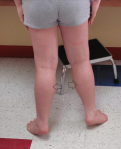What do we mean by Becker Muscular Dystrophy?
Muscular Dystrophy belongs to that group of genetic degenerative disorders which involve progressive weakness and wasting of voluntary muscles of the body. This condition is named after the German doctor Peter Emil Becker who first described the disorder.
Becker Muscular Dystrophy (BMD) is among those common nine kinds of dystrophies; which are characterized by the slow weakness and wasting of skeletal muscles that are used for movement and heart muscles as well. Such dystrophies are common among the men than women. Being a genetic disorder; your family history of disease increases your risk of getting affected.
Despite of being more common in men than women; males usually inherit it from their mothers, i.e. females are the carriers of this disease but they usually do not exhibit any symptoms.
How is the Becker Muscular Dystrophy an inherited disease?
When a particular flawed gene or mutation of a particular gene on the X-chromosome makes its associated protein (named as dystrophin) partially functional, this results in the Becker Muscular Dystrophy. That is the reason that Becker Muscular Disease is also known as ‘X-linked recessive genetic defect’ i.e. it is inherited due to a defective gene on the X-chromosome.
Males manifest the symptoms of this disease because they have only one X- chromosome. While the females have two X- chromosomes, so they usually do not show any signs or symptoms as the healthier X- chromosome compensate for the defective one.
What are the signs and symptoms of Becker Muscular Disease?
The symptoms usually begin to appear during the childhood and are diagnosed by the age of 11 years. But the severity of the disease varies from person to person. The symptoms may include:
• Gradual but progressive muscle weakness
• Muscles cramps on exercising
• Inability to walk independently by the age of 16
• Loss of walking by the age of 40 -60 and at times, 20-30
• Severe upper extremity and trunk muscle weakness
• Toe-Walking and frequent falls
• Difficulty in breathing and Heart disease; particularly, Dilated Cardiomyopathy
• Skeletal and Muscular Deformities
• Fatigue
• Difficulty in getting up from the floor and Climbing stairs
• Loss of balance, co-ordination and muscle mass
What are the treatment options suggested to treat Becker Muscular Dystrophy?
The treatment is generally focused at treating the symptoms and enhancing the patient’s quality of life. Treatment options suggested are generally supportive and include the following:
• Physical therapy is suggested to encourage the activity as the inactivity (like bed rest) can further worsen the condition. Muscle strengthening exercises are suggested to maintain muscle strength.
• Massage, Compression treatment and night Splints may be advised to treat muscle cramps.
• Use of assistive devices like; knee, leg or back braces are suggested to keep the muscles flexible.
• Occupational Therapy is advised; where patients are helped and taught to use orthopedic appliances like; wheel chairs and other assistive devices as well to improve movement and training for doing the daily tasks in new ways is also provided.
Contact Alliance Physical Therapy for the adequate and enhanced treatment of any of your neuromuscular disorder. Our certified therapists develop customized treatment plans according to your needs and preferences and utilize patient proven treatment techniques to heighten the quality of your life.
